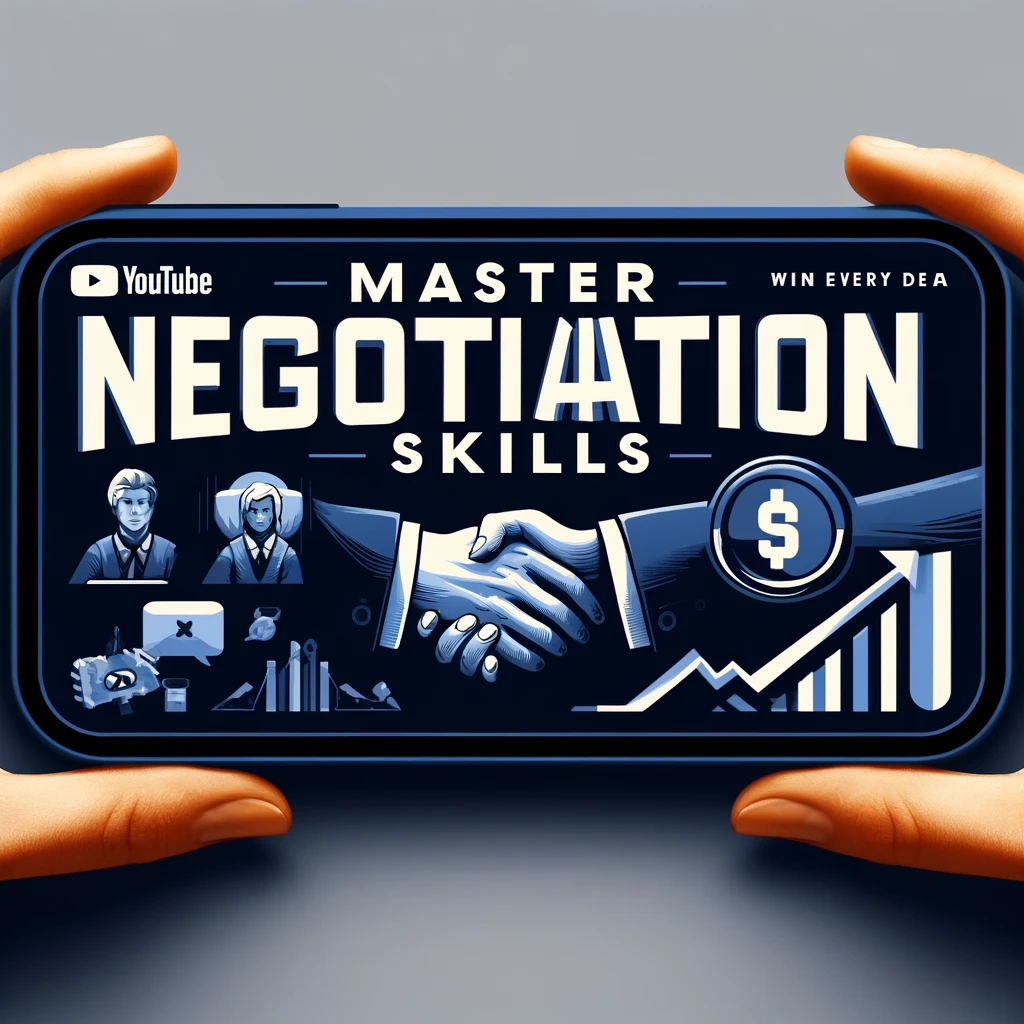Negotiation is an essential skill in almost every aspect of life. Whether you’re negotiating a salary, a business deal, or even where to go for dinner, the ability to negotiate effectively can have a profound impact on your personal and professional success. But while some people may seem naturally gifted at negotiation, the truth is that negotiation is a skill that anyone can learn, practice, and master over time. Mastering negotiation skills isn’t just about getting what you want—it’s about creating value, building strong relationships, and reaching outcomes that satisfy both sides.

In this blog post, we’ll dive deep into the art and science of mastering negotiation skills. We’ll explore proven strategies, psychological insights, and effective techniques that can transform how you approach negotiations. We’ll also look at real-life examples and expert tips to help you turn every negotiation into an opportunity for growth and success. Whether you’re a beginner just learning the ropes or a seasoned negotiator looking to refine your approach, this guide will provide you with the tools you need to excel.
Table of Contents
Why Are Mastering Negotiation Skills Important?
Negotiation is at the heart of every successful deal and agreement. Being skilled at negotiation gives you an edge in your career and personal life by empowering you to communicate effectively, understand others’ perspectives, and reach beneficial agreements. Mastering negotiation skills leads to:
- Increased Confidence: Knowing how to negotiate boosts your confidence and prepares you to handle challenging conversations.
- Better Outcomes: Skilled negotiators often achieve better results that reflect their goals without compromising relationships.
- Stronger Relationships: A successful negotiation isn’t just about winning—it’s about creating trust and mutual respect, which are essential for long-term connections.
Understanding the Basics of Negotiation
Negotiation is a process where two or more parties aim to reach a mutually beneficial agreement. To mastering negotiation skills, you need to understand its basic components:
- Interests: The needs, desires, and concerns of each party. Understanding the other party’s interests is key to finding common ground.
- Alternatives: Known as the “Best Alternative to a Negotiated Agreement” (BATNA), this is what you’ll do if you can’t reach an agreement. A strong BATNA improves your leverage.
- Options: These are the potential solutions or trade-offs that can satisfy both parties.
- Standards: Objective criteria that can be used to measure the fairness of the agreement, such as market value, precedents, or laws.
Key Strategies for Mastering Negotiation Skills
Preparation is Key: Before entering any negotiation, preparation is crucial. Being unprepared can weaken your position, whereas thorough preparation can significantly enhance your confidence and improve your outcomes. Start by:
- Researching: Gather as much information as possible about the other party, the market, and the context of the negotiation.
- Clarifying Goals: Define your primary objectives and your “must-haves.” This ensures you know what you’re working toward.
- Identifying BATNA: Determine your best alternative if the negotiation doesn’t go as planned. This provides a safety net and increases your bargaining power.
Listen More Than You Speak Great negotiators know that listening is one of the most powerful skills in any negotiation. By actively listening, you gain insight into the other party’s needs, concerns, and interests. This allows you to identify areas of alignment and opportunities for compromise. Listening also builds trust, as it demonstrates that you value the other person’s perspective.
- Use Active Listening Techniques: Nodding, summarizing, and asking follow-up questions show you’re engaged.
- Observe Body Language: Nonverbal cues can reveal more than words. Notice facial expressions, tone of voice, and gestures to gain a deeper understanding of the other party’s emotions.
Focus on Interests, Not Positions In negotiation, it’s easy to become fixated on positions—specific demands or outcomes that one side wants. However, focusing solely on positions often leads to conflict or deadlock. Instead, look beyond positions to uncover underlying interests—the “why” behind what someone wants.
For example, if you’re negotiating a salary increase, your position may be “I want a 10% raise.” But your interest might be achieving financial security or recognition for your hard work. Similarly, the employer’s position may be a limited budget, but their interest is retaining valuable talent. By addressing interests, you open up possibilities for creative solutions, such as additional benefits, flexible hours, or professional development opportunities.
Emphasize Win-Win Solutions: Mastering negotiation skills often involves adopting a win-win mindset. In a win-win negotiation, both parties aim to reach an agreement that satisfies everyone’s interests, rather than one side “winning” at the other’s expense. This approach is especially important in long-term relationships, where collaboration and goodwill are key.
Identify Shared Goals: Focus on areas where your goals overlap. Shared goals create common ground and help foster a cooperative atmosphere.
Be Open to Creativity: Win-win outcomes often require thinking outside the box. Brainstorm multiple solutions that address both parties’ interests, even if they differ from the initial proposals.
Stay Calm and Manage Emotions: Mastering Negotiation Skills can become heated, especially when stakes are high or emotions are involved. However, staying calm and composed gives you a significant advantage. Emotional control prevents impulsive decisions, allows you to respond thoughtfully, and keeps the conversation productive.
Practice Mindfulness: Take deep breaths and focus on remaining present, especially if you start feeling anxious or frustrated.
Pause When Needed: If the negotiation becomes tense, suggest a short break. This gives both sides a moment to reset, process information, and come back with a clear mind.
Use “I” Statements: Express your thoughts in a way that doesn’t come across as confrontational. For example, say “I feel concerned about…” instead of “You’re being unreasonable.”
Be Willing to Walk Away: One of the most powerful tools in any negotiator’s toolkit is the willingness to walk away. This doesn’t mean being inflexible; it’s about recognizing when a deal doesn’t meet your essential criteria. If the agreement falls short of your minimum requirements, having the confidence to step back can prevent future dissatisfaction. Knowing your BATNA (Best Alternative to a Negotiated Agreement) gives you leverage and empowers you to walk away if the offer isn’t favorable. When both parties know that walking away is an option, they’re more likely to approach the table with genuine interest in finding a mutually beneficial solution.
Leveraging the Power of Silence: Silence can be a surprisingly effective negotiation tool. When you’re silent, it creates space for the other party to fill the gap, often leading them to share additional information or rethink their position. Silence can also give you a moment to collect your thoughts before responding. After proposing, stay silent. Resist the urge to justify or elaborate immediately. Allowing the other side time to react can reveal valuable insights into their thought process and willingness to negotiate.

Common Pitfalls in Negotiation
While learning to master negotiation skills, it’s important to be aware of common mistakes that can derail even the most well-prepared negotiator:
- Being too rigid: A rigid, inflexible stance can close doors to potential win-win solutions.
- Not preparing thoroughly: Without adequate preparation, you may overlook important information or undervalue your position.
- Ignoring nonverbal cues: Body language and tone are just as important as words. Ignoring these signals can lead to misunderstandings.
- Taking things personally: Separate the people from the problem. Negotiation is about finding solutions, not assigning blame.
Practical Tips to Improve Your Negotiation Skills
- Role-Play Scenarios: Practice with a friend or colleague by simulating common negotiation situations. This helps you get comfortable with negotiation techniques in a low-stakes environment.
- Learn from Past Experiences: Reflect on past negotiations, both successful and unsuccessful. Identify what worked, what didn’t, and how you can improve.
- Stay Informed: The more you know about negotiation tactics, the better equipped you’ll be. Books like “Getting to Yes” by Roger Fisher and William Ury are excellent resources.
- Use Positive Language: Frame proposals positively. For example, instead of saying, “I can’t do that,” try, “Here’s what I can offer…”
Real-Life Examples of Masterful Negotiation
- Business Negotiation: Consider a company negotiating a contract with a supplier. Rather than pushing for the lowest possible price, a skilled negotiator might focus on building a relationship, exploring bulk purchase discounts, or securing favorable payment terms, creating a mutually beneficial partnership.
- Salary Negotiation: When negotiating a job offer, focus on the entire compensation package rather than just the salary. Ask about benefits, bonuses, and career growth opportunities to reach an agreement that aligns with your goals.
Conclusion:
Negotiation is more than just a skill—it’s an art that combines empathy, strategy, and adaptability. By mastering negotiation skills, you enhance your ability to reach favorable agreements and strengthen relationships, build trust, and add value to every interaction. Remember, effective negotiation isn’t overpowering or outsmarting the other side; it’s about understanding needs, finding common ground, and crafting outcomes that satisfy both parties.
Whether negotiating a major business deal, discussing your salary, or simply resolving a conflict with a friend, mastering negotiation skills will empower you to communicate effectively, achieve your goals, and create lasting, positive relationships. So, take these strategies, put them into practice, and watch your negotiation skills transform every opportunity into a win-win.
FAQ
What does it mean to Mastering Negotiation Skills?
Mastering negotiation skills means learning and applying strategies to reach mutually beneficial agreements. It involves understanding interests, active listening, and creating solutions that satisfy both parties.
How can I prepare for a negotiation?
Preparation includes researching the other party, clarifying your goals, identifying your BATNA (Best Alternative to a Negotiated Agreement), and understanding the context of the negotiation. Good preparation strengthens your confidence and position.
Why is active listening important in Mastering Negotiation Skills?
Active listening helps you understand the other party’s interests and concerns, building trust and uncovering areas for compromise. It shows respect and opens up pathways to solutions that benefit both sides.
What is a win-win negotiation?
A win-win negotiation is an approach where both parties work towards an agreement that satisfies everyone’s key interests rather than only benefiting one side. This approach helps build lasting relationships and encourages positive outcomes.



